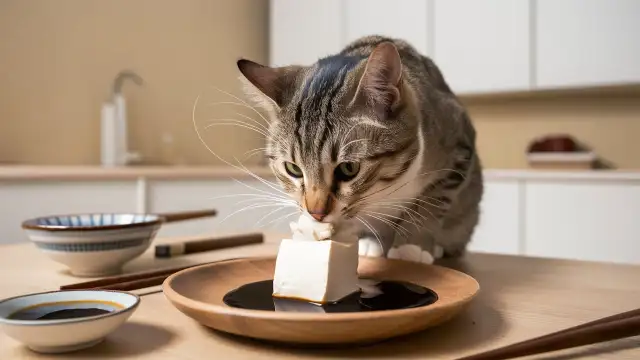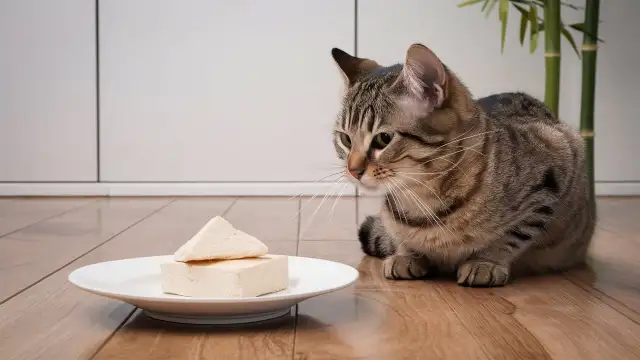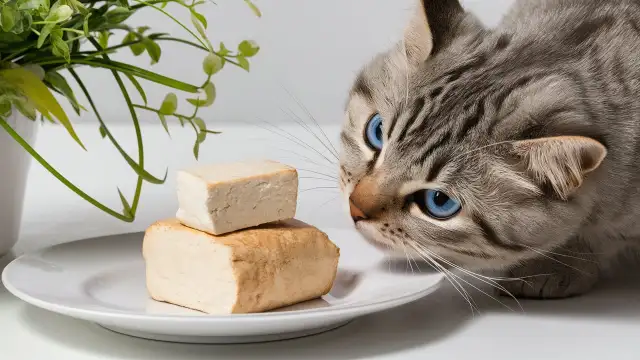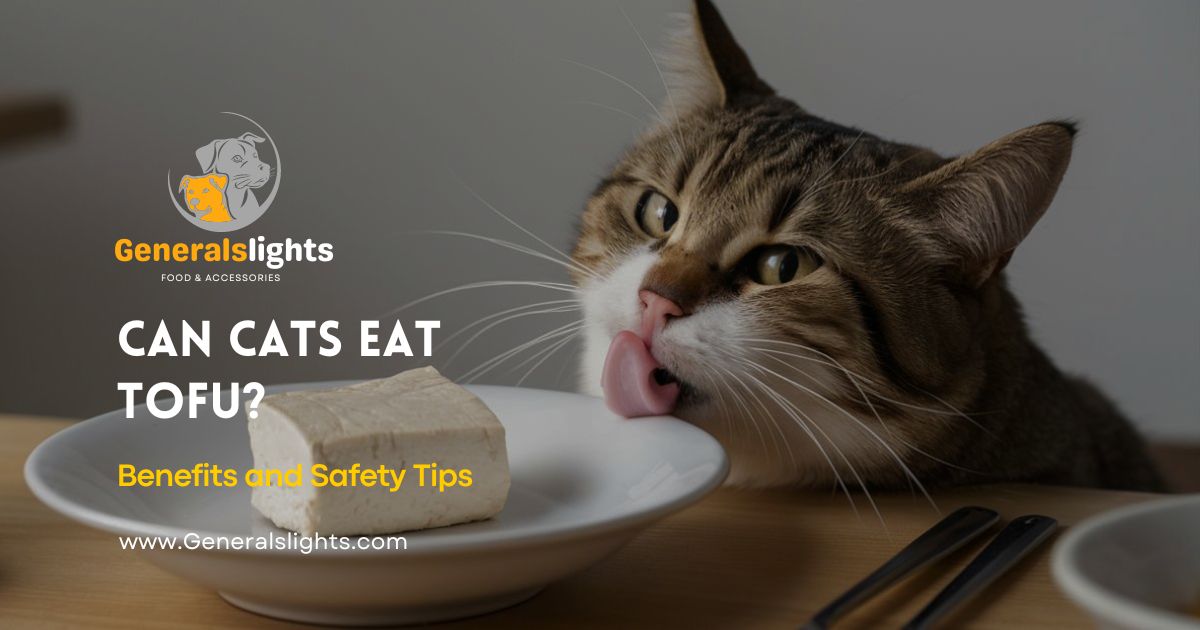Tofu, a popular plant-based protein, often raises questions among cat owners regarding its safety for feline consumption. While cats are obligate carnivores, tofu might seem like a healthy alternative. This article explores vet-reviewed facts, potential benefits, risks, and FAQs about feeding tofu to cats, ensuring their well-being. Can Cats Eat Tofu?
Ever caught your cat eyeing your tofu stir-fry and wondered if it’s safe to share? As pet parents, we want the best for our furry companions, but with cats’ unique dietary needs, not every human food is feline-friendly. Let’s dive into whether tofu is a safe treat for your cat.
Tofu, derived from soybeans, is a protein-rich food often enjoyed by humans. However, cats are obligate carnivores, requiring nutrients found primarily in animal proteins. While small amounts of tofu aren’t toxic to cats, it lacks essential nutrients like taurine, making it an unsuitable substitute for their regular meat-based diet.
What Do Cats Require in Their Diet?

Cats require a diet rich in animal-based proteins, as they are obligate carnivores. Essential nutrients include taurine, an amino acid crucial for heart and eye health, and arachidonic acid, a fatty acid found in animal fats.
They also need vitamins A, D, and B12, which are naturally present in animal tissues. Cats rely on meat to fulfil their energy needs, and their diet must be balanced with the right proportions of protein, fat, and minimal carbohydrates to maintain optimal health.
Nutritional Highlights of Tofu
Protein: Tofu is a good source of plant-based protein, providing about 8 grams per 100 grams.
Calcium: Often fortified with calcium, tofu can contribute to bone health, though cats require calcium from animal sources.
Low in Fat: Tofu is low in fat, particularly saturated fat, making it a low-calorie option.
Lacks Taurine: Unlike animal proteins, tofu does not contain taurine, an essential amino acid for cats.
Isoflavones: Contains isoflavones, which may have hormonal effects, although their impact on cats is unclear.
Precautions When Serving Tofu to Your Cat
When serving tofu to your cat, do so in moderation. Tofu lacks essential nutrients like taurine, crucial for a cat’s health. Always offer plain tofu without added seasonings, salt, or sauces, as these can be harmful.
Monitor your cat for any signs of allergies or digestive upset, such as vomiting or diarrhoea, after eating tofu. Additionally, tofu should never replace meat in your cat’s diet; it’s best treated as an occasional, small snack rather than a regular meal component.
Do I Have to Cook Tofu Before Feeding It to My Cat?
No, you don’t have to cook tofu before feeding it to your cat. Tofu can be served raw, but it should be plain and unseasoned. Ensure it’s fresh and cut into small, manageable pieces to prevent choking. Always offer tofu in moderation as an occasional treat.
Cats and Soy
Can Cats Drink Soy-Based Drinks?
Cats should avoid soy-based drinks. These beverages often contain additives, sugars, and preservatives that can be harmful to cats. Additionally, soy can cause digestive issues or allergic reactions in some cats. Since cats are obligate carnivores, their dietary needs are best met with water and animal-based nutrients, not plant-based drinks.
Cats and Tofurky
Tofurky, a meat substitute made from soy, is not suitable for cats. It often contains added spices, flavours, and other ingredients that can be harmful to feline health. Cats need animal-based proteins and nutrients that Tofurky does not provide. Stick to a meat-based diet for optimal cat nutrition.
Understanding Cats’ Carnivorous Nature
Cats are obligate carnivores, meaning their bodies are designed to thrive on a diet primarily composed of meat. They require specific nutrients, like taurine and arachidonic acid, found only in animal tissues. Their digestive systems are optimized for processing animal proteins and fats, not plant-based foods.
Why Cats Are Obligate Carnivores
Cats are obligate carnivores due to their evolutionary adaptation to a diet rich in animal proteins. Their bodies lack certain enzymes needed to process plant-based nutrients efficiently. Essential nutrients like taurine and vitamin A are found only in animal tissues, making a meat-based diet crucial for their health.
Potential Health Risks of Feeding Tofu to Cats

Feeding tofu to cats can pose several health risks. Tofu lacks essential nutrients like taurine, which is critical for heart and eye health. It may also cause digestive upset, including diarrhoea or vomiting, especially if given in large amounts.
Additionally, soy can trigger allergic reactions in some cats. The presence of isoflavones in tofu may impact feline hormone levels, although this is less understood. Overall, tofu should be given cautiously, if at all, and never as a regular part of their diet.
Allergies and Intolerances
Cats can develop allergies or intolerances to soy products like tofu, leading to symptoms such as itching, vomiting, or diarrhoea. Since soy is not a natural part of their diet, it may cause adverse reactions in some cats. Monitor for signs of discomfort and consult your vet if concerns arise.
How Tofu Fits Into a Balanced Diet
Tofu does not fit into a balanced diet for cats due to their need for animal-based proteins and essential nutrients like taurine, which tofu lacks.
While it can be a low-calorie treat in very small amounts, it should never replace meat or form a significant part of a cat’s diet. A balanced diet for cats relies on high-quality animal proteins.
Supplement vs. Staple
| Aspect | Supplement | Staple |
| Purpose | Occasional addition to diet for variety or enrichment | Primary, regular part of the diet |
| Nutritional Value | Provides limited or specific nutrients | Delivers essential nutrients required daily |
| Examples | Tofu as a small treat | Meat-based proteins as main food source |
| Frequency | Rarely or in small amounts | Consistently included in meals |
| Impact on Health | Safe if given occasionally, but should not replace meat | Crucial for overall health and well-being |
How to Introduce Tofu to Your Cat’s Diet

To introduce tofu to your cat’s diet, start with a small amount to gauge their reaction. Cut the tofu into tiny, manageable pieces and offer it plain, without any seasonings. Observe your cat for any signs of digestive upset or allergic reactions, such as vomiting or diarrhoea.
If there are no adverse effects, tofu can be given occasionally as a treat, but never as a regular part of their diet. Always prioritize a balanced diet with meat-based proteins for their nutritional needs.
Comparing Tofu with Other Protein Sources for Cats
Tofu and animal-based proteins differ significantly in their suitability for cats. Tofu provides plant-based protein but lacks crucial nutrients like taurine and vitamin A, essential for feline health. In contrast, animal proteins (e.g., chicken, and fish) offer a complete amino acid profile and vital nutrients that support a cat’s overall well-being.
Animal proteins also meet the dietary needs of obligate carnivores better, providing the necessary fats and vitamins that tofu cannot. While tofu can be a low-calorie treat, it should never replace animal proteins, which are fundamental for a balanced and healthy diet for cats.
Tofu vs. Animal-Based Proteins
Tofu
Tofu is a plant-based protein with low fat and calories but lacks essential nutrients like taurine, which cats need. It may cause digestive issues and is not a suitable replacement for animal proteins. Tofu should be offered in very small amounts and not as a regular diet component.
Animal-Based Proteins
Animal-based proteins, such as chicken and fish, provide complete amino acid profiles and essential nutrients like taurine and vitamin A. These proteins align with a cat’s obligate carnivore nature, supporting overall health and energy needs. They are vital for a balanced and nutritious diet for felines.
What to Do If Your Cat Overeats Tofu
If your cat overeats tofu, monitor them closely for signs of digestive upset, such as vomiting, diarrhoea, or lethargy. Ensure they have access to plenty of fresh water to help flush out their system. Avoid giving tofu in the future and consult your vet for advice on managing their diet.
If symptoms persist or worsen, seek veterinary care promptly. Overeating tofu, while generally not life-threatening, can disrupt your cat’s digestion and overall health, so addressing it quickly is essential.
Signs of Overconsumption
- Vomiting: Your cat may vomit if they’ve eaten too much tofu, as their digestive system struggles with plant-based protein and added ingredients.
- Diarrhoea: Overeating tofu can lead to diarrhoea, indicating that the stomach and intestines are reacting poorly to the tofu’s soy content.
- Lethargy: If your cat appears unusually tired or lacks energy, it could be a sign of digestive discomfort or an adverse reaction to the tofu.
Addressing Common Dietary Mistakes
Ignoring Nutritional Needs: Failing to provide a balanced diet with essential nutrients like taurine and vitamins can lead to health issues in cats.
Overfeeding Treats: Excessive treats, including tofu, can unbalance a cat’s diet and contribute to obesity or digestive problems.
Feeding Human Food Regularly: Regularly feeding human foods, especially those not designed for cats, can disrupt their nutritional balance and lead to deficiencies.
Not Consulting a Vet: Making dietary changes or introducing new foods without veterinary guidance can risk your cat’s health and nutritional needs.
Assuming All Foods Are Safe: Not all foods safe for humans are safe for cats. Always research or consult a vet before introducing new foods into their diet.
Consulting Your Veterinarian
Consulting your veterinarian is crucial when considering dietary changes or introducing new foods like tofu to your cat. Vets can provide personalized advice based on your cat’s health, age, and dietary needs. They can help assess whether a new food is appropriate and how to introduce it safely.
Regular vet consultations ensure your cat’s diet remains balanced and nutritious, preventing potential health issues and ensuring their overall well-being. Always seek professional guidance before making significant changes to your cat’s diet.
Vet Opinions on Non-Meat Proteins for Cats
Veterinarians typically advise against using tofu as a primary protein source for cats. Cats require animal-based proteins for essential nutrients like taurine and vitamin A. While small amounts of tofu can be an occasional treat, a meat-based diet is crucial for meeting all of a cat’s nutritional needs.
Cat-Safe Treats: What to Know
For cat-safe treats, choose those specifically designed for felines, rich in animal proteins and free from harmful additives. Treats should be given in moderation, comprising less than 10% of their diet. Homemade treats should use safe, simple ingredients without spices or additives.
Choosing Safe Treats
Select treats specifically formulated for cats to ensure they meet feline dietary needs. Look for treats high in animal-based proteins and free from harmful additives, such as sugars and artificial flavours.
Treats in Moderation
Treats should only make up a small portion of your cat’s daily diet, typically less than 10%. Overindulgence can lead to nutritional imbalances and obesity.
Homemade vs. Store-Bought
If preparing homemade treats, use ingredients safe for cats, like cooked meats or plain fish. Avoid human foods with spices or additives. Store-bought treats often undergo safety testing and are formulated to be nutritionally balanced.
FAQs
Can cats eat tofu safely?
Tofu is not toxic but lacks essential nutrients for cats and can cause digestive upset if fed in large amounts.
Is tofu a good protein source for cats?
No, tofu is plant-based and lacks vital nutrients like taurine and vitamin A, making it unsuitable as a primary protein source.
How should tofu be prepared for cats?
Tofu should be plain, unseasoned, and cut into small pieces if given as an occasional treat. Cooked or raw tofu can be used.
Can tofu replace meat in a cat’s diet?
No, tofu cannot replace meat. Cats require animal-based proteins to meet their dietary needs and provide essential nutrients.
What should I do if my cat eats too much tofu?
Monitor for symptoms like vomiting or diarrhoea. Provide fresh water and consult your vet if symptoms persist or worsen.
Conclusion
Tofu, while not harmful in small amounts, is unsuitable as a regular part of a cat’s diet due to its lack of essential nutrients. Cats thrive on animal-based proteins, so tofu should be treated as an occasional treat if at all, to ensure their health and well-being.
Read More :

Emerson is an expert in the world of pets, specializing in understanding diverse breeds, nutrition, and health. His deep knowledge ensures your pets receive the best care, from balanced diets to top-notch health advice, keeping them at their happiest and healthiest.











